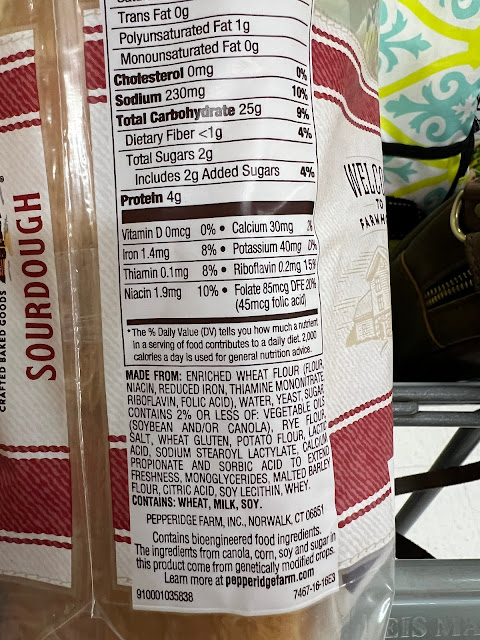Yesterday was another in a long line of cold, grey winter days here on the farm. Not much to note other than a few party tricks from dearest Chester.
Can you make your tongue into an "M"? Chester can.
Can you touch the top of your nose with your tongue? That's right... Chester can! What a fun chap!
It was yet another day of Ginger hanging out near the dry lot - eternally hopeful that an extra meal will come her way. (seen below looking longingly at the donkeys' breakfast time... don't worry she already had her own!)
Amazingly, she runs back and forth from pasture to treat box whenever she knows we are passing by. Either that, or Ginger has cloned herself! Yes, that mailbox on top of the fence is filled with graham crackers... and she knows it!
*****🥖🍞🥖*****
I thought that today might be a good day to talk a little more about sourdough bread and my obvious obsession with it.
Yes, I'll admit, I have become something of a bread snob. Actually, if truth were told - I only began eating actual bread about 2 ½ years ago when I received my first sourdough starter from a friend. Up to that point, I ate what most people call bread - that which one finds in a store, ensconced in plastic - an industrialized, undigestible, sugar-laden approximation of something that our ancestors ate as a mainstay in their diet.
Sadly, today's store-bought bread has very little in common with the loaves that scores of earlier generations consumed as they broke bread and shared the most basic act of human existence... eating. Aside from the absence of usable nutrients, today's bread has an amazing shelf-life, due in part to the preservatives added to the mixture and the treated plastic wrapper in which it comes.
So what is the basic difference between home-baked sourdough bread and store bought?
That question is answered in two parts - ingredients and how the process of bread-making changes those ingredients into that which is absorbed by our digestive systems.
Let's look at the ingredients listed on a bag of store-bought "sourdough" bread. First off... to call this sourdough is a big stretch.
Flour, water, yeast (to make the bread rise), sugar (to feed the yeast and produce the carbon dioxide that makes the bread rise), vegetable oil (for softness, but why? no, seriously, why?), rye flour, wheat gluten (added to strengthen the dough), potato flour (helps to reduce staling and enhance toasting), lactic acid (sour flavoring), sodium steroyl (added to disperse the fats and make the bread softer), calcium propionate and sorbic acid (preservatives to prevent molding) monoglycerides (to improve texture and shelf life), malted barley flour (improves flavor), citric acid (tenderizes the gluten), soy lecithin (adds back structure to the tenderized gluten), whey (adds protein)
Wow... a whole lot of chemistry goes into a loaf of industrialized bread!
Now, what goes into a loaf of sourdough bread?
Flour, water, salt and any add-ins you might choose (whole grains, seeds, nuts, fruit, spices, etc) A basic loaf of "artisan" sourdough bread has just three ingredients at its core. Then what makes it rise? You probably noticed there is no yeast in traditional sourdough bread.
Ahhhhh.... but there is. And all of the magic for sourdough bread comes in the "starter". What is the starter? (amazingly, nothing more than flour and water that, with time and patience, and a whole lot of luck, grows it's own colony of native yeast obtained from the flour and the atmosphere).
Yes, the magic of sourdough bread comes from the "starter" also known as the "Mother". It's what the pioneers carried with them as they swept across the country. And it's what "lives" in every sourdough bread baker's kitchen.
My starter:
 |
| My starter at 10 AM having just been fed |
Sourdough starter can be thought of as a living organism. In actuality, it is filled with lots of tiny living organisms... yeast and lactobacillus bacteria who thrive on the flour and water that they are fed. On the days that my mother is not being fed or used for baking, she lives in my refrigerator. Once a week, (which is at least how often I bake with her) I feed her (more flour and water) so that the yeasts and bacteria within her remain robust and active.









Comments
A friend bought me a bag of heritage flour, so I will give that a go first. But I am excited to learn how to bake sourdough and see if perhaps it will work for me. Thank you for breaking down the process for us. It sounds much less intimidating now! Blessings...
Chester's tongue has ruffles. L O L
Poor ginger. She probably thinks that she's starving. She doesn't look it!
Hope all is well up there. Hugs
I will copy recipe and send it to you.
It is made in a cast iron pan.
Wonderful treat.
No sour dough though, unbleached flour, salt, yeast, water . . .
I agree, not a fan of store bought . . .